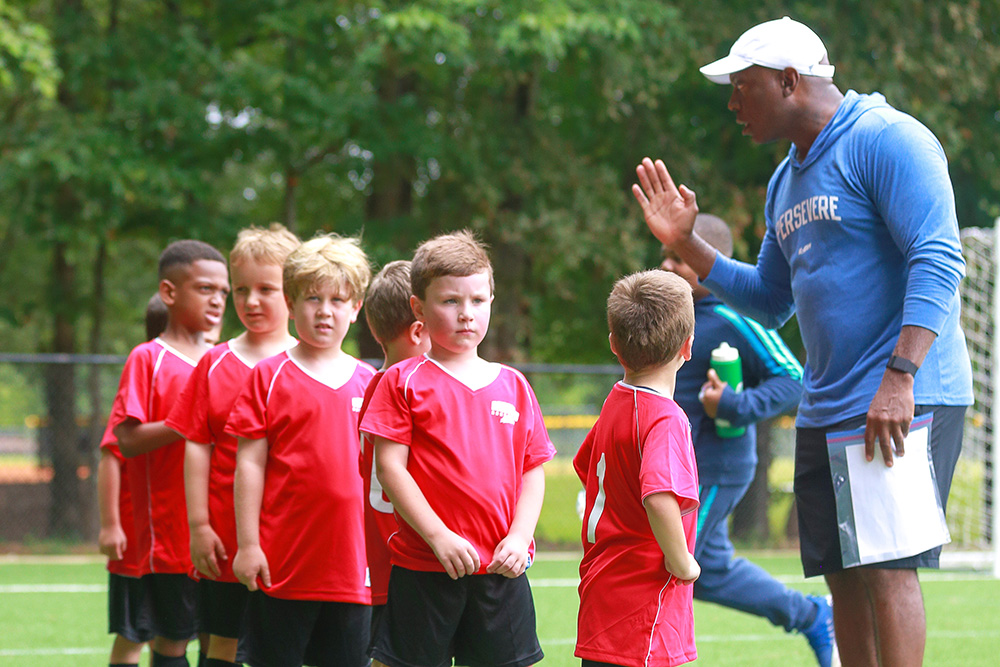My youngest son Miles, who is in first grade this year, has dabbled in sports without showing a consistent interest in any of them. In previous years, he played golf and basketball but was pretty noncommittal about continuing with either of them. This year was different. This year, he expressed a strong interest in soccer. That presented me with a challenge.
We are not a soccer family.
We don’t attend professional soccer games as fans.
No one in our immediate or extended family has ever played this sport.
But we wanted to encourage Miles in his newfound passion. My wife found a league that had a team with openings in his age group, missing one critical role: a head coach.
So, I stepped forward to coach my son and other children I didn’t know. I felt uncomfortable and unsure of my abilities to coach six and seven-year-olds in a sport I knew nothing about. But I gave myself a pre-season pep talk and drew on my personal experience as an executive coach to forge ahead.
I have often coached leaders as they begin to do something that feels uncomfortable to them. Once, I coached a senior executive to have a discussion with his new boss about a difficult topic. He needed to have a dialogue that would allow him to understand their working boundaries regarding interviewing prospective employees and to clarify his area of responsibilities in comparison to the other direct reports on the new boss’s team. The executive was very reluctant to have this direct conversation and the thought of it produced great anxiety in him. We discussed this issue for months and helped him work up to the discussion by roleplaying possible scenarios and reviewing the pros and cons of various approaches. But it worked. He initiated the talk, got the information he needed, and gained confidence that he could start and follow through on a difficult dialogue with his supervisor. Sometimes being a leader requires us to do something that is completely foreign to us, but it will yield the results we want.
As a leader, and a coach of leaders in a variety of roles and industries. I am familiar with this feeling. I am sure there are many leaders who are encountering challenges to their business in which their past experience proves no longer relevant. For example, we can’t compare pre-pandemic business practices to those we are evolving now, in real-time.
As we think about new behaviors, there are a few that you can practice that will serve you well during moments of change and transition. You can reframe what winning looks like based on new realities and communicate this to your team often to dislodge them from the past and move them toward a new future. Often, during times of crisis and upheaval, leaders focus on the execution of operations and may rely less on the behaviors that helped to achieve their success. But the behaviors are critical to fostering that success. Behaviors like listening, compassion, patience, remaining accessible, and communicating clearly all serve to help those closest to the work fulfill the organization’s vision.
Because there is so much uncertainty in our world today, and so many new experiences leaders are encountering, I thought I might share my takeaways from my first experience coaching young children in a sport that was new to all of us. You may find them useful in navigating these uncertain economic times with your team.
Build Trust
This is foundational to all healthy relationships and begins with maintaining confidences and being congruent with words and deeds. When I first met the players of the Raptors that I would be coaching, I began to help them feel comfortable with me and set the stage for candid communication. I learned each of their names, developed relationships with their parents, and consistently worked with them in a manner that was patient and reassuring. I never became volatile or yelled at, and I shared with them that we were on a learning journey together.
Listen to What is Said (And Not Said)
Listen to how your team communicates with you. Are they visual learners or auditory? Are they introverts or extroverts? Do they learn by studying an issue or with opportunities to practice? I noticed that some of the kids were not engaged in practice, so I began to ask them questions, like “Do you understand what a goal kick is?” or “Do you know how to throw the ball down the line?” I quickly learned that they didn’t understand what I was asking for, so I modeled the behavior for them. Then, the other coach and I then gave them opportunities to practice. Those that showed they understood the actions to take received positive reinforcement. Those that did not grasp the concepts yet received more coaching and instruction.
Communicate Clearly
Some of your team members need step-by-step instructions. Others can be given guardrails and encouraged to improvise. Knowing how to have meaningful communication with your team can save you a lot of time. I have found that with kids and adults, the simpler the communication, the better. With the Raptors, I wanted to get the kids used to the practice of covering a player. So, I would say “Cover number five,” but they didn’t engage in the way that I expected. However, I found that when I said “Attack the ball,” that got a different and desired reaction. Even though the word “attack” has a more aggressive connotation than the word “cover,” it was the term the soccer team members best responded to. With that direction, the Raptors proceeded to cover a play, attempt to take the ball, advance it toward our goal, and pass it to a player to score. Finding the method and message that produces the desired results with your team may take a bit of trial and error, but it’s worth it.
Get to Know Your Team
Get to know what your team values in the workplace and outside of the workplace. Taking an interest in knowing these things can build a relationship or repair one that needs mending. Getting to know six- and seven-year-old kids can be a challenge. But I discovered that if I allowed them to share in a way that felt comfortable to them, instead of the way that I feel comfortable, we could have successful interactions. In other words, I met them where they were. Some kids were more talkative, so I listened. Others were quieter, so I observed them and maybe asked them a question or two if we had some one-on-one time. Some had great soccer knowledge, others had little. Some were motivated by the promise of a treat for a winning game, while others just wanted to have fun, and cared little about who won or lost. Because I took the time to get to know them and their personal communication styles, when it came time to coach it was a much easier process. I knew their names, what motivated them, and how to get them involved. Do you know the members of your team well enough to do the same?
Praise and Reward Regularly
We often only think of congratulating when we win the war, but what about the small battles along the way that signal steps in the right direction? Make time to acknowledge your team members regularly and be sure to spread it around. For example, I was rewarded for good work on the field, but also for helping the team in other ways, like encouraging team members, remaining positive, and cheering from the sidelines. We shouldn’t only reward a final result, but also the effort and skill developed over the course of a project. Employees like to know how they are performing, and praising excellence leads to continued excellence.
Keep Learning
When I am coaching kids, I must remember to fall in love with the process of leading through discomfort and lack of knowledge and embrace the learning as I go. I know that when I apply my proven leadership skills, no matter the situation, good results will follow.
I also must remember to manage my own stress about being in unfamiliar territory and serve as a model for others. Skills learned in the corporate setting translated effectively to youth soccer coaching. You’ll find that the leadership skills you develop in one role will help you succeed in the next, no matter how different they are.
As leaders, we should never stop learning and discovering new ways of managing for success.








